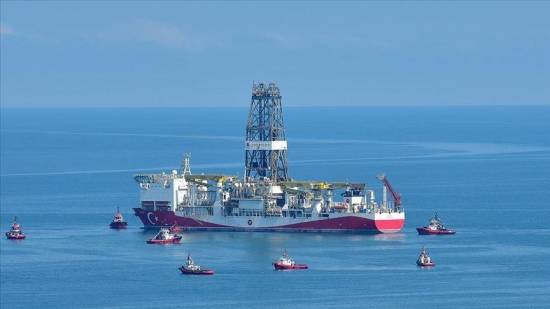Turkey's gas discoveries in Black Sea could cut annual import bill by $6B
Turkey's gas discoveries in the Black Sea will reduce the country's annual gas import bill by $6 billion with a 20 billion cubic meters (bcm) production per year, the head of the Natural Gas Distribution Companies Association of Turkey (GAZBIR) said on Friday.
The country continued drilling testing wells after the Fatih drillship's giant discovery of 405 bcm in the Tuna-1 well located in the Sakarya gas field, around 170 kilometers off the Black Sea last year.
It was the largest offshore gas discovery in the world last year while it was the second-largest in overall discoveries.
"The amount of 10 biggest gas discoveries in the world last year was about 3.2 trillion cubic meters," Yasar Arslan told Anadolu Agency, adding that the United Arab Emirates found the biggest discovery reaching 2.3 trillion cubic meters while Russia discovered 220 bcm.
After Turkey's 405 bcm gas discovery in the Black Sea, Fatih drilled the Turkali-1 and Turkali-2 testing wells along with the Amasra-1 well, which is an exploration well located in the northern part of the Sakarya gas field.
Fatih is currently drilling the testing well of Turkali-3 while another drillship, Kanuni, is carrying out completion tests in the Turkali-2 well.
Turkish President Recep Tayyip Erdogan announced Friday that the Fatih drillship discovered 135 bcm in the Amasra-1 well, which increases Turkey's gas discoveries in the Black Sea up to 540 bcm.
"Production of 15 bcm from Tuna-1 discovery could meet 30% of Turkey's annual gas need which was 48.2 bcm in 2020. It would also meet all of the household need for 25 years," Arslan noted, adding that the new gas find is sufficient enough to meet Turkey's total gas need for three years.
"The new discovery in the Amasra-1 well at the water depth of 1,938 meters and 3,850 meters total depth, will also be included in the Sakarya Gas Field Development Project. The project includes the construction of seabed gas production systems, a gas processing center within the Filyos industrial zone, and pipelines to connect those units," Turkish Petroleum (TPAO), Turkey's national oil company, said in a statement on the new gas find.
Melih Han Bilgin, chairman and CEO of TPAO, said the new discovery in the "world-class" western Black Sea basin, the Sakarya gas field, has a potential to support additional developments.
Production to fractionally increase
The first gas production from the Sakarya gas field is planned for 2023. As a start, the daily gas production from the field will be around 10 million cubic meters which corresponds to 3.5 bcm annually and the production will increase gradually to its plateau level.
He said that the maximum production potential in the Black Sea could increase up to 20 bcm per year with the new discovery.
"In total with Tuna-1 and Amasra-1 discoveries, Turkey's natural gas import bill could reduce by $5-6 billion when production rises to the plateau level of 20 bcm," Arslan said.
Around 155 kilometers of pipeline will be built underneath the sea till Filyos onshore in Zonguldak, a port city in the Black Sea.
Turkish Petroleum will invest 780 million Turkish lira only in the production and transmission facilities in relation to the field although the overall investment volume in the Sakarya gas field is not publicly announced.
The pipeline will carry the natural gas that will be produced underneath the sea to the gas processing facility of which ground breaking ceremony was held Friday in Filyos industrial zone.
Following the processing, the gas will flow into Turkey's gas distribution system.
Discoveries to trigger investments in Turkey's gas sector
Palzor Shenga, vice president for upstream research and analysis at Norway-based Rystad Energy, said the Kanuni drillship is scheduled to conduct well testing in Amasra-1 well hence providing some insight on the productivity of the reservoir encountered.
"Nevertheless, if proven, in combination to the additional resource from future discoveries, it will trigger significant investments in Turkey’s gas sector. The development of the deep-water field will help to meet Turkey’s increasing demand for natural gas," Shenga said.
Turkey is currently dependent on gas imports to meet its demand as domestic production meets 1% of the country's gas need.
"The gas is mainly imported from Russia, Iran and Azerbaijan. Rystad Energy also estimates the breakeven price for these fields to be between $3.00 and $3.50 per MMBtu, competitively better than the imported gas. Thus, will aid in substantial reduction to the country’s import costs," Shenga stated.
"Furthermore, although Turkey’s path towards energy self-sufficiency remains very long and uncertain, the country’s newfound hope that low-cost discoveries are feasible will pave the way for further exploration and development programs," he said, pointing out that it is an exciting time for the Black Sea, a frontier basin which has for long not delivered to its expected potential./aa


